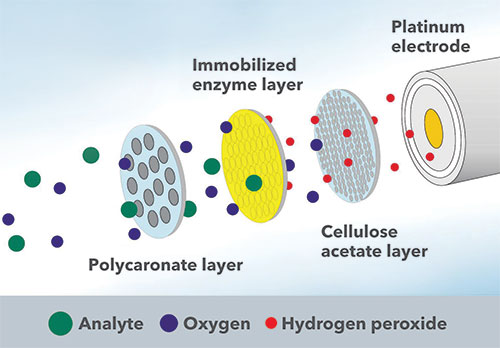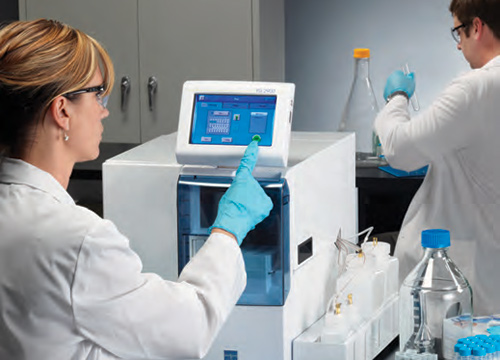Biosensor and Enzyme Technology
YSI’s innovative enzyme electrode technology harnesses the power of enzymatic specificity and catalysis to provide a rapid, precise analytical tool. Enzymes, which are powerful biological catalysts, can accelerate reactions by factors of at least one million. Additionally, enzymes are highly specific for both the reaction catalyzed as well as their choice of substrate. YSI immobilizes substrate-specific enzymes between two selective, interfering membranes and couples the membrane component to a platinum electrode, which results in a highly specific measurement for a given substrate.
To better explain how the enzyme electrode technology works, an example of a common ingredient analysis, i.e., dextrose (D-glucose), will be used. An enzyme probe is fitted with a three-layer membrane containing immobilized glucose oxidase enzyme in the middle layer. The face of the probe, covered by the membrane, is situated in a buffer-filled sample module into which the dextrose sample is injected by the instrument. The dextrose diffuses through the first membrane. When it contacts the immobilized glucose oxidase, it is rapidly oxidized, producing hydrogen peroxide (H2O2).
...this occurs in a matter of seconds, which results in a sample analysis cycle of 60 seconds or less per chemistry analyzed...
H2O2, in turn, passes through the inner membrane and is oxidized at the platinum anode, producing electrons. A dynamic equilibrium is achieved when the rate of H2O2 production and the rate at which H2O2 leaves the immobilized enzyme layer is constant and indicated by a steady-state response. The electron flow is linearly proportional to the steady-state H2O2 concentration and, therefore, to the concentration of the substrate. All of this occurs in a matter of seconds, which results in a sample analysis cycle of 60 seconds or less per chemistry analyzed (Figure 1).

Figure 1. YSI Enzyme Electrode Technology. Enzyme specificity and proprietary membrane attributes allow for rapid, precise and essentially interference-free analysis.
Sample analysis requires little or no preparation due to the YSI Biochemistry Analyzer’s unique sample chamber design and membrane characteristics, which makes the enzyme electrode impervious to sample color, pH, turbidity, cell concentrations, salts, proteins, detergents and other low molecular weight interferences. Additionally, only small sample volumes are needed, ranging between 10–50 μl. The YSI 2900 Series Biochemistry Analyzers are highly flexible, modular platforms with a range of configurations, options and accessories to meet the needs of various industry applications and scale of operations (Figure 2).

Figure 2. The YSI 2950 Biochemistry Analyzer can simultaneously measure up to six chemistries for raw materials, R&D, in-process, and final product sample analysis.
Up to six different chemistries can be measured simultaneously using automated, high-throughput options, i.e., 96-well plates, stat mode for immediate process sample checks and automated on-line sample analysis. Each analyzer offers an intuitive graphic user interface, onboard training videos and multiple data management options. As compared to other conventional methods, such as HPLC, YSI Biochemistry Analyzers offer a low-cost alternative for both initial capital investment and cost per chemistry test. Other features include low maintenance requirements and easy product changeover.
Additional Blog Posts of Interest
Determination of Ethanol in Beer